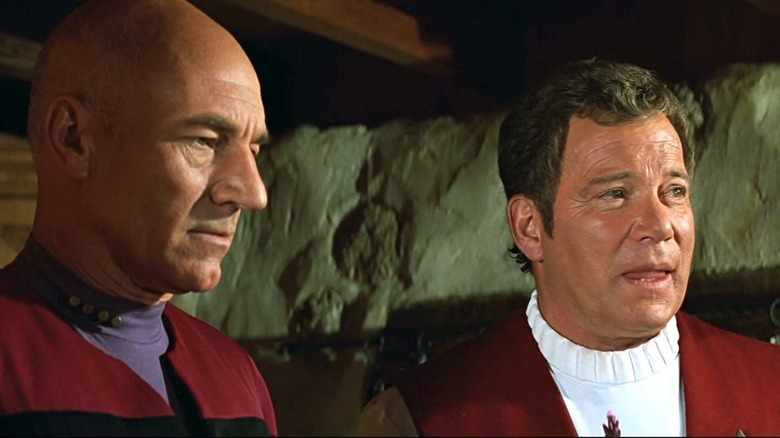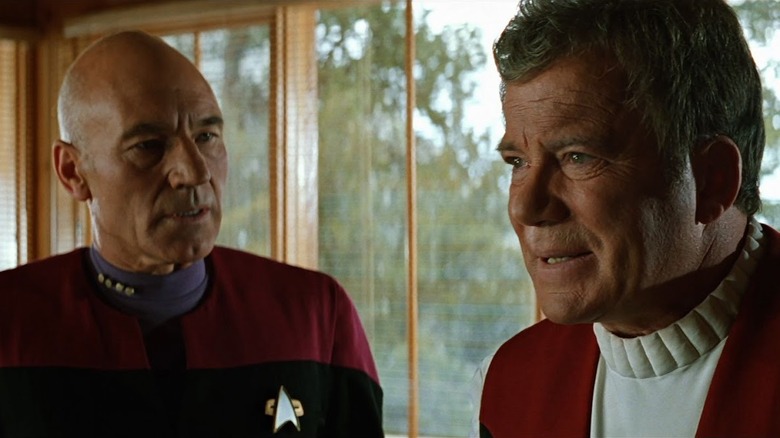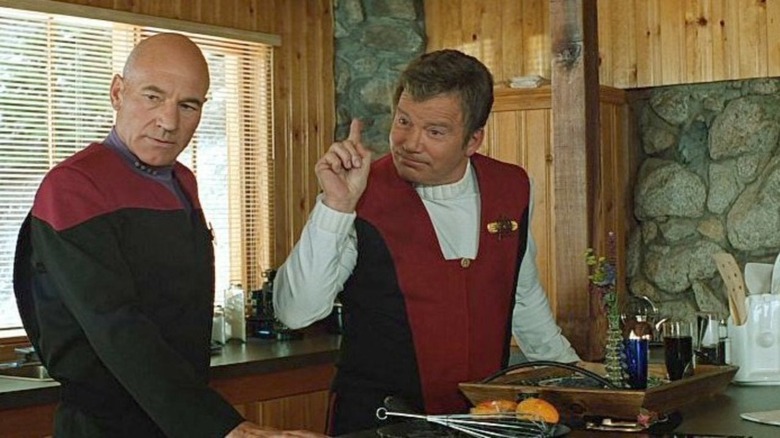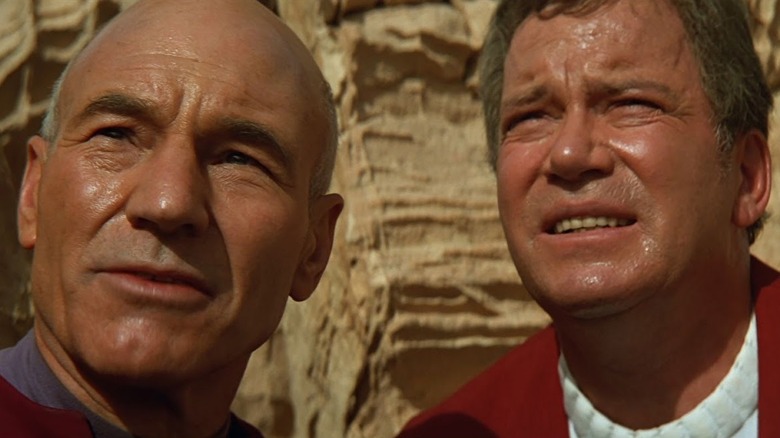Star Trek: Generations Could Have Been A Captain Kirk Vs. Picard Showdown
David Carson's 1994 film "Star Trek: Generations" has a farfetched premise, even by Trek's own outlandish standards. It seems there is a mysterious energy ribbon called the Nexus that periodically floats through the galaxy. The Nexus destroys any starships it encounters but also sweeps living beings into its own mysterious pocket dimension. The Nexus' pocket dimension is essentially Heaven, where its victims live out their happiest memories. Time also stands still in the Nexus, allowing its inhabitants to remain there eternally.
The physical existence of Heaven, one might think, would be a heady concept for a humanist franchise like "Star Trek." How would the universe react if Heaven was in a physical location one could visit? One might think there would be a mad dash to get there as soon as possible, rapidly depleting the galaxy's population.
Sadly, "Generations" sidesteps any interesting ideas in favor of a useless "pass the torch" story wherein Captain Picard (Patrick Stewart) and Captain Kirk (William Shatner) could meet face-to-face. Because time has no meaning in the Nexus, both Picard and Kirk can enter at different times, but meet as if no time has passed at all. They exit the Nexus together merely to thwack Malcolm McDowell in the face.
According to the oral history book "The Fifty-Year Mission: The Next 25 Years: From The Next Generation to J. J. Abrams," edited by Mark A. Altman and Edward Gross, there was an earlier draft of "Generations" that wasn't about a temporal Nexus, but a rip in space that an interdimensional villain slips through. That treatment, by the unbeloved producer Maurice Hurley, was going to feature a scene in which Picard recreated Kirk on the holodeck ... and fought him.
Mayhem and chaos and blood
Hurley, Trekkies might know, was a producer during the first two tempestuous seasons of "Star Trek: The Next Generation." He was the one who had a notorious beef with actress Gates McFadden and who had her fired for the second season. When Hurley left, McFadden was re-hired.
Longtime "Star Trek" writer/producer Brannon Braga recalls the early plans to make a "Star Trek: The Next Generation" movie, and revealed a time-old producer's tactic: commission two different scripts from two different writing teams, then select the better script. It allows a producer to hedge their bets, just in case one of the scripts is a stinker. Hurley was assigned one script, and Braga and Ron D. Moore were hired to write the other. Braga was confident that Hurley's treatment was the "junk" idea that was only being built to be thrown away. Braga and Moore, not incidentally, are the credited screenwriters on the film.
Hurley recalled his idea clearly, though. He liked the idea of interdimensional travelers who, when trying to return to their home dimension, did a lot of damage to the galaxy. Hurley had a not-very-good simile:
"You can compare it to a parent in a schoolyard with his two-year-old child, with the parent on one end and the child on the other. The child is in a dangerous situation, about to die. You rush across the schoolyard, stepping on toes, knocking down children, breaking bones, and smashing heads to get to your baby. Then you save your baby and you look back at all the mayhem and chaos and blood that you have caused among all these other two-year-old children."
Maybe "killing a bunch of two-year-olds" wasn't a great concept to attach a "Star Trek" script to.
Call in the Kirk
Hurley continued:
"You could have killed one of them, but it wouldn't have made a difference to you until after the fact when you looked back and said, 'Oh my God, what did I do? I'm sorry, but I just didn't have a choice.' That's the story. These other people who are here and are about to destroy us are basically saying, 'Sorry, but there's nothing we can do about it. You're all going to have to die.'"
This notion was kind of folded into the Braga/Moore script. In the finished movie, Dr. Soren (McDowell) has been using special missiles to extinguish stars, hence changing the gravity throughout the galaxy, and redirecting the Nexus so that he could get back inside. The problem was that extinguishing stars destroyed their entire solar system, and Soren was prepared to wipe out a whole inhabited world for his own selfish ends.
The "Kirk vs. Picard" notion enters Hurley's story when Picard discovers that the interdimensional beings he's facing are simplistic and violent and have no ability to be reasoned with. Desperate for a solution, Picard would rush to the Enterprise's holodeck and consult a virtual version of Captain Kirk, known to be a masterful tactician. Picard, Hurley seemed to feel, wasn't "tough" enough to face off against his invented interdimensional beings, and required the cowboy violence of Kirk.
It wasn't so much a "who would win in a fight?" query as a "who's a better captain?" query. Who is better suited in a battle situation with desperate, unreasonable people?
Classic Trek enemies
Hurley elucidated:
"My story was a chance to put these two classic characters — Picard and Kirk — and two really good actors together and let them bang on each other. Picard realizes there's no subtext to the attack. In a battle with a Klingon or a Romulan, there's a subtext. Romulans want to kick your ass and, in the process, they want you to know how damn smart and superior they are. These people have no subtext and Picard begins to investigate."
Naturally, Kirk had some key knowledge.
"[T]he only other time on record that this has ever happened, and the only person who witnessed it, was Kirk. Picard attempts to get a point of view from the Kirk character that is different from what he's getting from pure facts. But that's not enough, so he starts manipulating the image, which produces a couple of bizarre scenes between Picard and Kirk — and they get pretty confrontational at certain moments. You want to bring back Kirk and not have it get confrontational? Kirk will get confrontational with anyone. In 'Star Trek V,' Kirk got confrontational with God."
Braga noted that Hurley didn't even finish this script, so it seems like it was doomed from the start. Needless to say, Hurley's idea was abandoned, and Paramount went with the other story. The Kirk/Picard meeting was kept, as was the above-mentioned villain's motivation.
It should be reiterated that Kirk wasn't necessary to write a good "Next Generation" movie, but the studio seemed fixated. The final film isn't great, but it seems they did the best they could under the circumstances.



